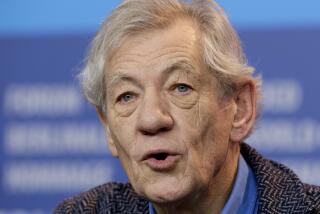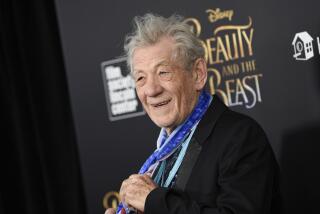IAN McKELLEN SELLING THE BARD TO ALL CLASSES
- Share via
Actors don’t need costumes, makeup, props, settings, lighting, special effects or even other actors. All they really require is a little space, a little illumination (possibly not even that), something to say, someone to listen and--working so minimally--a very large talent.
Ian McKellen ended his one-man show, “Acting Shakespeare,” at the Westwood Playhouse Sunday night and moved along to San Francisco, whose citizens will, I hope, appreciate what a transatlantic treasure has arrived in their midst.
McKellen’s mesmerizing performance, an emotional roller coaster touching hilarity, exultation and intimations of madness and tragedy, has been duly reviewed and celebrated in these pages, but he is worth another huzzah, not least in the hope that he can be induced to come back one of these days.
There was something doubly special about his next to last presentation, on Saturday night before a full house. In the first couple of rows sat about two dozen sixth graders from Hobart Boulevard Elementary School, most wearing T-shirts proclaiming Shakespeare and “Will Power.”
They are in a special program for gifted students and they have been immersed in Shakespeare all year long. When, at the start of the evening, McKellen played his customary game of getting the audience to shout out the names of the 37 plays, the youngsters came up with the rarities like “Pericles,” “Timon of Athens” and “Cymbeline,” which even the adult faithful have trouble remembering.
The youngsters had made a Shakespeare scrapbook, which took a special prize in a citywide schools conference. They showed it to McKellen and he showed it to us. There were vigorous illustrations in watercolor, and sonnets written by class members in favor of various plays and themes and one to Shakespeare himself, which McKellen read.
Like McKellen’s triumphant outing, the multi-ethnic class was a thrilling proof that the Shakespearean poetry and drama cut across four centuries and the Seven Seas and the ages of man.
But the class was also proof that Shakespeare, so often taught by dreary, recitative rote, a burden to be linked with plane geometry and second-year Latin, can be brought alive (like the same geometry and Latin) by a dedicated and inspired teacher.
The Hobart teacher, a tall and amiable young man in tennis shoes, is Rafe Esquith, a UCLA graduate who has been teaching for only four years, the last two at Hobart. With a certain degree of understatement, he told me he has always been nuts about Shakespeare.
The class interest will not end with the school year. They’re all going up to Ashland, Ore., to take in its annual Shakespeare Festival this summer.
McKellen, arriving from the back of the house, stopped to chat with the class before he began his show, brought them on stage for his delightful fall-down finale and invited them backstage to chat with him after the show.
The one slight worry might be that the children will expect all Shakespearean acting to equal McKellen’s, but he is, so to say, in a class by himself. Still, the Hobart group will never have reason to doubt how spellbinding the Bard can be.
Listening to McKellen Saturday night, I could only remember a morning in 1946 when John Gielgud (one of his few peers) came to visit a Shakespeare course I was taking. Standing in an ancient tweed jacket and baggy gray flannels, he recited some passages, talking now and again, as McKellen does, about how he helped himself memorize and understand the lines.
With only the power of his voice, Gielgud was Lear, howling with grief as he walked on stage with his dead daughter in his arms. He was a different Hamlet, traditionally moody and introspective, as against McKellen’s boyish and more frenzied Hamlet, a lighthearted young man trying to cope with most monstrous events.
Both performances were pinioning in their power and craft, and the echoes rang across 40 years.
McKellen, striding about in a tieless white shirt and shiny black suit, and slightly resembling a waiter who has just gone off duty, has only one prop, a throny wooden chair. (Later on, a functional teacup does for a candle.)
It is all he requires, and he is the best friend Shakespeare has had since Olivier in his film-making prime. McKellen, looking into those attentive front rows, might well have been pleased to think that there would be audiences for himself and Shakespeare tomorrow and tomorrow and tomorrow.
More to Read
The biggest entertainment stories
Get our big stories about Hollywood, film, television, music, arts, culture and more right in your inbox as soon as they publish.
You may occasionally receive promotional content from the Los Angeles Times.










